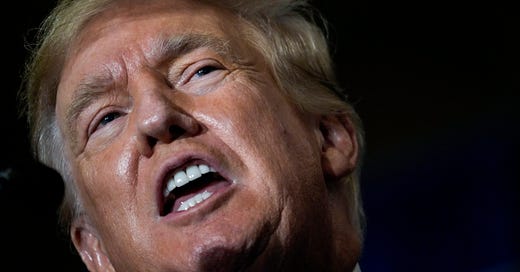
Trump’s Escalation in the ‘Gender War’
Even as the former president tries to energize his tired campaign by pushing on trans issues, is a window opening for a moderate approach?
Two months into the lackluster start of his 2024 presidential bid, Donald Trump rolled out the most reliable weapon in the MAGA arsenal: a full-scale attack on transgender Americans and the medical and therapeutic communities that care for them.
In a three-and-a-half-minute video screed first posted on his Truth Social platform, Trump announced an onslaught of gender-war measures going far beyond the questions raised in recent years about bathroom use, trans participation in women’s sports, or the prescription of puberty blockers or hormones for adolescents. “On day one,” vowed Trump, “I will revoke Joe Biden’s policies on so-called ‘gender-affirming’ care—ridiculous!” On the right, “gender-affirming” care has become synonymous with premature prescriptions of cross-sex hormones, puberty blockers, and surgeries. In reality, it is the common-language phrase that marks a kinder, gentler approach to what is now known as “gender dysphoria” (referring to clinically significant distress or impairment related to feelings of gender incongruence), as opposed to previous treatments for “gender identity disorder” (a now obsolete term that held the gender incongruence itself to be the disorder).
Trump announced he would ask “Congress to pass legislation that recognizes only two genders, male and female,” and “that they are assigned at birth.” He vowed that he would “sign a new executive order instructing every federal agency to cease all programs that promote the concept of sex or gender transition at any age” and to ask Congress to outlaw the use of federal funds to pay for transition procedures.
The Department of Justice would be commandeered for the anti-trans effort. Trump promised “a private right of action for victims [sic] to sue doctors who have unforgivably performed these procedures on minors.” Thus a detransitioner might decide years or even decades after transitioning to take doctors, and presumably other caregivers, to court for damages. Trump would also order an investigation of “Big Pharma and the big hospital networks to determine whether they have deliberately covered up the horrific long-term side effects of sex transitions in order to get rich at the expense of vulnerable patients” or colluded to market “hormones or puberty blockers that are in no way approved for this use.” This is misleading language about Lupron, the most commonly used puberty-blocking drug. It was approved by the Food and Drug Administration in the 1980s for treatment of “precocious puberty,” but not for gender dysphoria, a diagnosis that had not by that point come into widespread use. In recent years, questions have been raised about potential long-term side effects of puberty blockers; they are not intended as a long-term treatment and are generally regarded by the medical community as a relatively safe part of gender care for adolescents.
Throughout the video Trump was dog-whistling furiously to rile up his traditional base. While curbing “transgender ideology” has become a central tenet of the MAGA and MAGA-adjacent right in recent years—even National Review averages several articles per week dunking on the excesses of gender advocacy—Trump is, as is his wont, recklessly disregarding what have heretofore been the limits of the debate. Gone is the we’re-just-trying-to-protect-kids-and-save-women’s-sports façade, replaced by naked efforts to prevent transition for all, regardless of age, and attacks on the therapeutic and medical systems that have improved the process and made it available to more patients. The agenda is equal parts fear and loathing.
Whether this ploy is enough to help revitalize Trump’s presidential effort is difficult to assess. The Republican bench is deep with aggressive culture warriors and Florida Governor Ron DeSantis, Trump’s top rival, has until now dominated the lineup. But now that Trump has spoken, what MAGA candidate will want to be seen to be more moderate than he on transgender issues?
At the same time, there’s a moderation window opening for President Biden and Democrats in general. They can use this as an opportunity to step away from those on the left who have used the trans rights movement as a battering ram in their war against mainstream society, heteronormativity, the patriarchy, et cetera, et cetera. Consider, for example, the response of the omnipresent Chase Strangio, deputy director for transgender justice and staff attorney at the American Civil Liberties Union and go-to spokesperson for media on all things trans. When Congress recently passed the Respect for Marriage Act, codifying the right of same-sex marriage, Strangio wrote:
I feel an inexplicable amount of rage witnessing the Senate likely overcome the filibuster to vote to codify marriage rights for same-sex couples. . . . I find it disappointing how much time and resource went into fighting for inclusion in the deeply flawed and fundamentally violent institution of civil marriage. I believe in many ways, the mainstream LGBTQ legal movement caused significant harm in further entrenching the institution of marriage as an organizing structure of US civil society.
To the degree that this sort of radicalism has become the face of the movement for preserving citizenship liberties for gay, lesbian, bisexual, and trans Americans, it’s hardly a wonder that it provokes an ugly reaction. And the practical effect is most felt by trans people: Same-sex attraction has been, in recent years, normalized in a way that matters of gender identification have not. Given the tiny slice of the population that is trans—studies report estimates of less than half of one percent of Americans, even allowing for a slight uptick among the young—the two giant phalanxes of culture warriors are fighting over a very small battlefield. It’s hard to escape the impression that the true objective of each side has more to do with destroying the other or with winning votes through fear than with actual trans people.
The first side to betray its extremists is the likelier victor, and that should be easier for moderate Democrats than for the MAGA Republicans. A reasonable politician could appeal to the broad middle of America that wants to see neither cruelty toward trans people nor the disestablishment of the nuclear family. The actual issues—where should people urinate, how to ensure fair athletic competition, how to square the rights of children and parents—are subject to reasonable negotiation. Outside cases of immediate death or obvious maiming, state interventions in contravention of broadly accepted medical standards and practices are invidious to individual rights. A moderate approach would not only spare the general populace from the cultural carnage but improve the lot of transgender people.
When I began to transition—it was not that long ago—it seemed possible to hope that, at some point, that would not be the thing that defined me. I wanted “re-assimilation” into mainstream society, not revolution against it. I thought that the trans rights movement would take the path charted by the marriage equality movement. The road to normality is now blocked from both left and right, but perhaps a middle way can be cleared.











